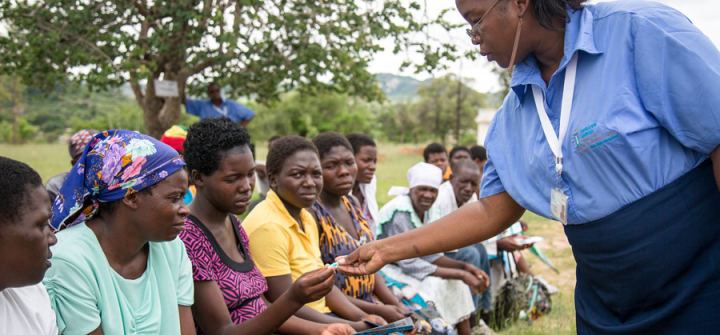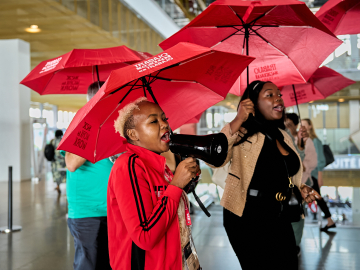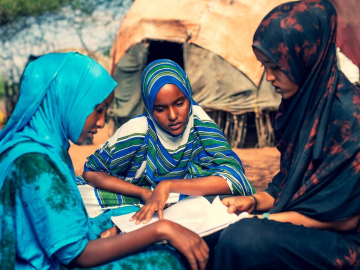The Trumped Up Gag Rule and Women's Health
A Q&A with MSI’s Marjorie Newman-Williams
One of US President Trump’s first moves in office was signing an Executive Order to bring back the Mexico City Policy, also known as the Global Gag Rule. The policy bars non-US organizations overseas from receiving any US funding if they provide counsel or discuss abortion as an option for women—even if those services are paid for with separate funds. (US funding for abortions overseas has already been prohibited under the 1973 Helms Amendment.)
Trump took the gag rule a step further: he expanded it vastly, to include not just family planning organizations, but all global health organizations that receive US funds—ultimately impacting an estimated $9.5 billion in aid (PAI). Several organizations, including Marie Stopes International, have made the difficult decision to not accept US funds as a result. GHN’s Dayna Kerecman Myers reached out to Marjorie Newman-Williams, vice-president and director of International Operations at Marie Stopes International for an update.
What will the return of the global gag rule mean for the health of women? Have studies during the gag rule years shown an increase in maternal mortality?
We are deeply concerned about the impact the Mexico City Policy will have on the health of women and girls in the developing world.
A 2011 WHO study found that abortion rates in sub-Saharan African countries increased while the Mexico City Policy was in force under President George W. Bush. The impact of its re-enactment today will be no less devastating, seriously reducing the impact of US development assistance for family planning in some of the world’s poorest countries. We estimate, over the next 4 years, the loss of our USAID-funded services alone will lead to 6.5 million unplanned pregnancies, 2.2 million abortions, and 21,700 maternal deaths.
As a health care provider Marie Stopes International knows that safe abortion is a vital component of women’s reproductive health care. A woman who doesn’t want the pregnancy will go to any lengths to end it. Putting greater obstacles in her path only makes her decision more dangerous.
Will the Dutch proposal for a fund to counter the impact of the policy succeed? Did similar measures filled the gaps back in 2001?
It was heartening that the Dutch government spoke up so swiftly about the need for urgent funding to mitigate the impact of the policy. In 2001, we saw a number of European governments step up their commitments, but we also know aid budgets today are under unprecedented pressure from the challenges of the 21st century. So we can take nothing for granted.
Beyond simply re-instating the policy, Trump has broadly expanded it, affecting all international organizations receiving US funds for health programs—not just family planning. What will this mean on the ground for MSI and other organizations?
This is the largest expansion of the terms of the Mexico City Policy to date, and many organisations will be trying to get to grips with what it means for them. One thing we know is that no global health organisations receiving US Ggovernment funding, whether for HIV prevention, malaria or TB, will even be able to tell a woman whether or not abortion is legal in her country.
Aside from the serious implications the Mexico City Policy has for women’s health globally, it is likely to cause huge confusion about referring women who have had an unsafe abortion for life-saving medical treatment, something that is legal in 179 countries worldwide. As many as 44,000 women die each year as the result of an unsafe abortion, and we are deeply concerned that this policy will increase that number.
Which countries with MSI programs are most vulnerable to the effects of this policy?
We will be doing everything we can to safeguard vital services for women and girls. However, as USAID funding accounts for 17% of our donor income, it’s inevitable that some services will need to be scaled back.
One of the most valuable achievements of our partnership with USAID has been expanding our outreach work: teams of nurses who bring contraceptive services to women who would otherwise have no access, either because they live in remote areas or are in extreme poverty. The loss of these services will be felt most keenly by women and girls from the most vulnerable groups.
Are NGOs optimistic that specific programs, like the President’s Emergency Plan for AIDS Relief, or PEPFAR, might be exempted, as former US President George W. Bush directed back in 2001?
This new expanded version of the policy is clear: any non-US organisation working in global health—whether HIV prevention, TB or malaria—must agree to its terms or be prohibited from receiving USAID funding. There has been no announcement on any exemptions to this. We can stay hopeful, but at this stage we would be hoping for a miracle.
Join the thousands of subscribers who rely on Global Health NOW summaries and exclusive articles for the latest public health news. Sign up for our free weekday enewsletter, and please share the link with friends and colleagues: Subscribe to GHN
Marie Stopes International/Cynthia Matonhodze





